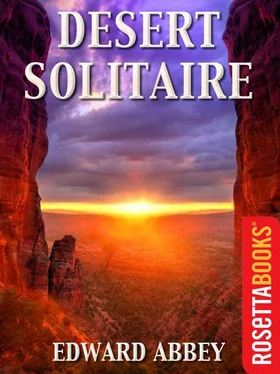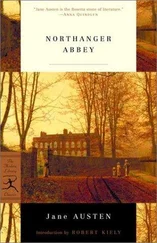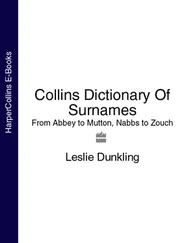Abbey, Edward - Desert Solitaire (Edward Abbey Series )
Здесь есть возможность читать онлайн «Abbey, Edward - Desert Solitaire (Edward Abbey Series )» — ознакомительный отрывок электронной книги совершенно бесплатно, а после прочтения отрывка купить полную версию. В некоторых случаях можно слушать аудио, скачать через торрент в формате fb2 и присутствует краткое содержание. Год выпуска: 2011, Издательство: RosettaBooks, Жанр: Старинная литература, на английском языке. Описание произведения, (предисловие) а так же отзывы посетителей доступны на портале библиотеки ЛибКат.
- Название:Desert Solitaire (Edward Abbey Series )
- Автор:
- Издательство:RosettaBooks
- Жанр:
- Год:2011
- ISBN:нет данных
- Рейтинг книги:4 / 5. Голосов: 1
-
Избранное:Добавить в избранное
- Отзывы:
-
Ваша оценка:
- 80
- 1
- 2
- 3
- 4
- 5
Desert Solitaire (Edward Abbey Series ): краткое содержание, описание и аннотация
Предлагаем к чтению аннотацию, описание, краткое содержание или предисловие (зависит от того, что написал сам автор книги «Desert Solitaire (Edward Abbey Series )»). Если вы не нашли необходимую информацию о книге — напишите в комментариях, мы постараемся отыскать её.
Desert Solitaire (Edward Abbey Series ) — читать онлайн ознакомительный отрывок
Ниже представлен текст книги, разбитый по страницам. Система сохранения места последней прочитанной страницы, позволяет с удобством читать онлайн бесплатно книгу «Desert Solitaire (Edward Abbey Series )», без необходимости каждый раз заново искать на чём Вы остановились. Поставьте закладку, и сможете в любой момент перейти на страницу, на которой закончили чтение.
Интервал:
Закладка:
We are indeed enjoying a very intimate relation with the river: only a layer of fabric between our bodies and the water. I let my arm dangle over the side and trail my hand in the flow. Something dreamlike and remembered, that sensation called déjà vu—when was I here before? A moment of groping back through the maze, following the thread of a unique emotion, and then I discover the beginning. I am fulfilling at last a dream of childhood and one as powerful as the erotic dreams of adolescence— floating down the river . Mark Twain, Major Powell, every man that has ever put forth on flowing water knows what I mean.
A human shout reaches our ears from the west shore. A man is waving at us from the landing of old Hite’s ferry. A warning? A farewell? He shouts once more but his words are unintelligible. Cheerfully waving back, we drift past him and beyond his ken without the faintest intimation of regret. We shall not see another of the tool-making breed for a long time and we could not care less.
Misanthropy? Shakespeare could say
Man delights not me,
No, nor woman neither.…
And Raleigh, too,
I wish I loved the human race,
I wish I loved its silly face.
And Jeffers:
Be in nothing so moderate
as in love of man.
But no, this is not at all what we feel at this moment, not at all what I mean. In these hours and days of dual solitude on the river we hope to discover something quite different, to renew our affection for ourselves and the human kind in general by a temporary, legal separation from the mass. And in what other way is it possible for those not saints? And who wants to be a saint? Are saints human?
Cutting the bloody cord, that’s what we feel, the delirious exhilaration of independence, a rebirth backward in time and into primeval liberty, into freedom in the most simple, literal, primitive meaning of the word, the only meaning that really counts. The freedom, for example, to commit murder and get away with it scot-free, with no other burden than the jaunty halo of conscience. I look at my old comrade Newcomb in a new light and feel a wave of love for him; I am not going to kill him and he—I trust—is not going to kill me.
(My God ! I’m thinking, what incredible shit we put up with most of our lives—the domestic routine (same old wife every night), the stupid and useless and degrading jobs , the insufferable arrogance of elected officials, the crafty cheating and the slimy advertising of the businessmen, the tedious wars in which we kill our buddies instead of our real enemies back home in the capital, the foul, diseased and hideous cities and towns we live in, the constant petty tyranny of automatic washers and automobiles and TV machines and telephones—! ah Christ !, I’m thinking, at the same time that I’m waving goodby to that hollering idiot on the shore, what intolerable garbage and what utterly useless crap we bury ourselves in day by day, while patiently enduring at the same time the creeping strangulation of the clean white collar and the rich but modest four-in-hand garrote!)
Such are my—you wouldn’t call them thoughts, would you?— such are my feelings, a mixture of revulsion and delight, as we float away on the river, leaving behind for a while all that we most heartily and joyfully detest. That’s what the first taste of the wild does to a man, after having been too long penned up in the city. No wonder the Authorities are so anxious to smother the wilderness under asphalt and reservoirs. They know what they’re doing; their lives depend on it, and all their rotten institutions. Play safe. Ski only in clockwise direction. Let’s all have fun together.
We drift on; the current seems to accelerate a bit as the mighty river squeezes between great red walls of sandstone rising on either side to heights of a thousand feet or more, cliffs so sheer and smooth even a bird could find no perch there. One little white cloud of dubious substantiality hovers above in the strip of blue between the canyon walls. Gazing up at it I think I hear, as in a dream, a confused rumble and roar, the sound of a freight train highballing down a mountain grade. Rapids.
Actually there are not supposed to be true rapids in Glen Canyon—only “riffles.” But it’s been a dry winter, the river is low, the rocks high. To us these foamy waves look like rapids.
“White water ahead,” says Ralph quietly, with a sort of complacent satisfaction, as if he had invented the phenomenon all by himself. And instead of doing anything about it he reloads his cheap pipe.
We’re rounding the first major bend in the canyon. From ahead comes the sound of the rapids—toneless vibrations growing stronger, what acoustical specialists call “white noise.” Like the sound of a waterfall. Supposedly a blissful and sleep-inducing impression on edgy nerves.
“I didn’t know we’d hit rapids so soon,” I say to Ralph. I open up my map, the only one we’ve brought with us, a Texaco road map of the state of Utah, and study the tributaries of the Colorado. “That must be where Trachyte Creek comes in,” I explain; “if we had life jackets with us it might be a good idea to put them on now.”
Actually our ignorance and carelessness are more deliberate than accidental; we are entering Glen Canyon without having learned much about it beforehand because we wish to see it as Powell and his party had seen it, not knowing what to expect, making anew the discoveries of others. If the first rapids are a surprise to us it is simply because we had never inquired if there were any on this stretch of the river.
Anyway, there’s no turning back now. After the entrance, the inescapable spasm. Between narrowing walls the river rushes at increasing speed. Our little boats bounce over choppy waves toward the whitecaps that now are visible, churning to foam around glistening wet boulders strewn across our course, boulders which seem to rise and fall as we race toward them on the bounding current.
There is no longer time enough to be frightened. I have a glimpse of the willows on the shore sweeping past, the only available gauge of our velocity, before we grab the paddles, settle deep into the boats and go to work trying to keep our bows headed into the waves.
Not that it makes much difference. The spray hits our faces and closes vision, the waves come aboard, in a moment we are soaking wet and spinning through the heart of the turmoil, bouncing off one rock and into the next. A great shining boulder looms before us, unavoidable; Ralph’s boat slams upon it and hangs there for a second or two until my boat, still roped to his, swings round in the spillway and pulls his free. Paddling furiously we right the boats and face the next obstacle, skin past it safely, bounce in and out of a few more troughs and suddenly find ourselves in the clear.
The waves smooth off as the river broadens through a wider channel, resuming its serene and steady flow. We’ve run our first rapids and are still alive. The boats are drifting along half full of water and we are drenched but the pipe in Ralph’s teeth is still burning, so quickly did it all happen.
Happy, exultant, we rest for a while in the loggy boats before bailing them out. If this is the worst Glen Canyon has to offer, we agree, give us more of the same.
In a few minutes the river obliges; a second group of rapids appears, wild as the first. Forewarned and overcautious this time, despite ourselves, we paddle too far out of the main current and end up aground in the shallows. We have to climb out of the boats and drag them over a pebble-covered bar until we again reach deep water. Hard work for game-legged Newcomb but he makes no complaint.
Читать дальшеИнтервал:
Закладка:
Похожие книги на «Desert Solitaire (Edward Abbey Series )»
Представляем Вашему вниманию похожие книги на «Desert Solitaire (Edward Abbey Series )» списком для выбора. Мы отобрали схожую по названию и смыслу литературу в надежде предоставить читателям больше вариантов отыскать новые, интересные, ещё непрочитанные произведения.
Обсуждение, отзывы о книге «Desert Solitaire (Edward Abbey Series )» и просто собственные мнения читателей. Оставьте ваши комментарии, напишите, что Вы думаете о произведении, его смысле или главных героях. Укажите что конкретно понравилось, а что нет, и почему Вы так считаете.












